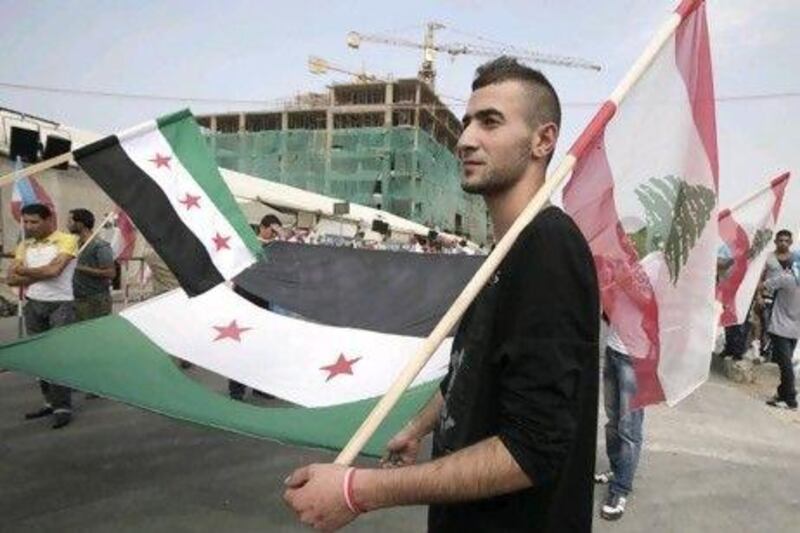BEIRUT // Heavy gunfire has erupted in central Beirut after protesters tried to storm the offices of Prime Minister Najib Mikati, demanding that he quit over the assasination of a top intelligence official.
An official said security forces had fired in the air.
Witnesses said at least two protesters had fainted, apparently as a result of tear gas fired by security forces after protesters breached an outer barrier around the prime minister’s offices.
Hundreds of protesters, waving flags from the anti-Syrian opposition Future Movement - a mainly Sunni Muslim party - and Christian Lebanese Forces as well as black Islamist flags, marched on Mikati’s offices after the funeral of Wissam Al Hassan.
They accused Syria of being behind Hassan’s killing and called for Mikati to resign.
Thousands of Lebanese waving the national flag had packed a central square in downtown Beirut for the funeral of Al Hassan, who was assassinated in a car bombing that many blame on the regime in neighbouring Syria.
Lebanese soldiers set up road blocks and cordoned off Martyrs Square, where Brig. Gen. Wissam Al Hassan's coffin, draped in a Lebanese flag, was to be brought for burial.
Al Hassan, 47, was a powerful opponent of Syria in Lebanon. He headed an investigation over the summer that led to the arrest of former information minister Michel Samaha, a Lebanese politician who was one of Syria's most loyal allies in Lebanon. He was among eight people killed in the attack on Friday.
"He was killed while he was defending his country," said Samer Al Hirri, who travelled from northern Lebanon to attend the funeral.
Ahead of the burial, there was a memorial ceremony attended by government officials and Al Hassan's wife Anna, his two sons, Majd and Mazen, and his parents.
Even before Friday's bombing, the civil war in neighbouring Syria had set off violence in Lebanon and deepened tensions between supporters and opponents of President Bashar Al Assad's regime. The attack heightened fears that Lebanon could easily plunge back into cycles of sectarian violence and reprisal that have haunted it for decades.
France's foreign minister said it was likely that Assad's government had a hand in the assassination. Laurent Fabius told Europe-1 radio that while it was not fully clear who was behind the attack, it was "probable" that Syria played a role.
"Everything suggests that it's an extension of the Syrian tragedy," he said.
Dozens of anti-Syrian protesters erected eight tents near the Cabinet headquarters in central Beirut, saying they will stay until Prime Minister Najib Mikati's government, which is dominated by the Shiite militant group Hezbollah and its allies, resigns. Hezbollah is Syria's most powerful ally in Lebanon, which for much of the past 30 years has lived under Syrian military and political domination.
"The Syrian regime started a war against us and we will fight this battle until the end," said protester Anthony Labaki, a 24-year-old physiotherapist who is a member of the right-wing Phalange Party. He said the protesters will not leave the area until Mikati's government resigns and those behind Al Hassan's killing are uncovered.
Syria's hold on Lebanon began to slip in 2005, when former Prime Minister Rafik Hariri, an opponent of Syria, was assassinated in truck bomb along Beirut's Mediterranean waterfront. Syria denied any role. But broad public outrage in Lebanon expressed in massive street protests forced Damascus to withdraw its tens of thousands of troops from the country.
For years after the pullouts, there was a string of attacks on anti-Syrian figures in Lebanon without any trials for those responsible. Assad has managed to maintain his influence in Lebanon through Hezbollah and other allies.
Samaha, the former minister arrested in Al Hassan's investigation, remains in custody. He is accused of plotting a wave of attacks in Lebanon at Syria's behest.
Syrian Brig. Gen. Ali Mamlouk, one of Assad's most senior aides, was indicted in absentia in the August sweep that saw Samaha arrested. Samaha's arrest was an embarrassing blow to Syria, which has long acted with impunity in Lebanon.
The car bombing struck Beirut's mainly Christian Achrafieh neighbourhood and also wounded dozens of people, including children.
Al Hassan will be buried in Beirut's Martyrs Square next to the late Hariri. Security was tight as thousands of people headed to the capital from around the country to attend the funeral.
Al Hassan's body will first be taken to police headquarters for an official procession to the square.
Policemen and soldiers cordoned off the square, searching people trying to enter and barring vehicles. Giant posters of Al Hassan were set up around Beirut ahead of the funeral, calling him a "martyr of sovereignty and independence".
On Saturday, Mikati linked the bombing to the Samaha case.
"I don't want to prejudge the investigation, but in fact we cannot separate yesterday's crime from the revelation of the explosions that could have happened," he said.
Mikati, who opponents say is too close to Syria and Hezbollah, offered to resign after the bombing. But President Michel Suleiman asked him to stay to not add to the instability.
Many of Lebanon's Sunni Muslims have backed Syria's mainly Sunni rebels, while Shiite Muslims have tended to back Assad. Assad, like many who dominate his regime is a member of the Alawite sect, an offshoot of Shiite Islam.
Al Hassan was a Sunni who challenged Syria and Hezbollah.





